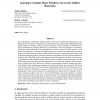164 search results - page 31 / 33 » Cognitive Artifacts in Complex Work |
VEE
2009
ACM
14 years 3 days ago
2009
ACM
r of high-level languages lies in their abstraction over hardware and software complexity, leading to greater security, better reliability, and lower development costs. However, o...
ICSE
2000
IEEE-ACM
13 years 9 months ago
2000
IEEE-ACM
Separation of concerns has been central to software engineering for decades, yet its many advantages are still not fully realized. A key reason is that traditional modularization ...
PREMI
2007
Springer
13 years 11 months ago
2007
Springer
The rapid expansion of the Internet has resulted not only in the ever-growing amount of data stored therein, but also in the burgeoning complexity of the concepts and phenomena per...
AAAI
2006
13 years 6 months ago
2006
Relationships between concepts account for a large proportion of semantic knowledge. We present a nonparametric Bayesian model that discovers systems of related concepts. Given da...
JMLR
2008
13 years 5 months ago
2008
The computational complexities arising in motor control can be ameliorated through the use of a library of motor synergies. We present a new model, referred to as the Greedy Addit...

